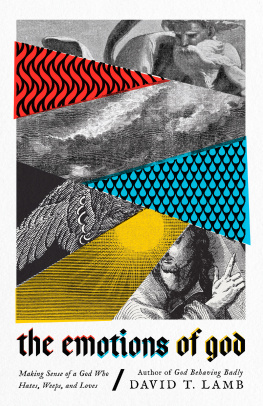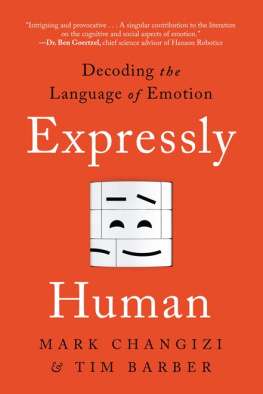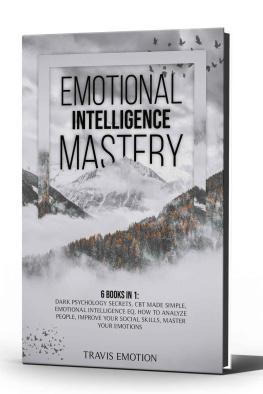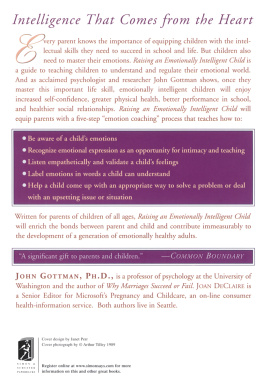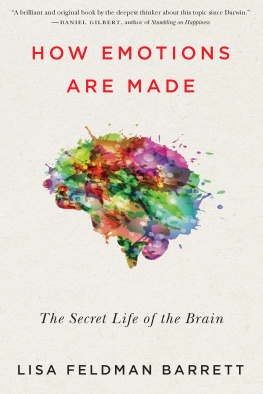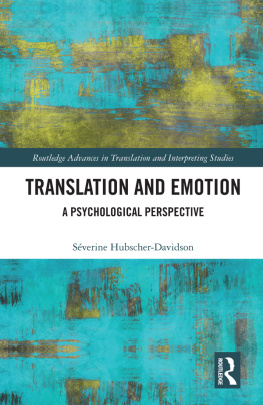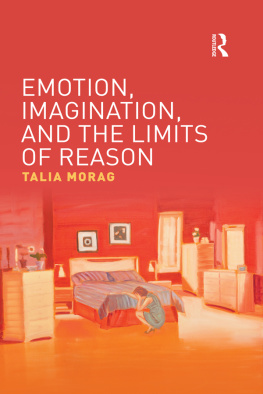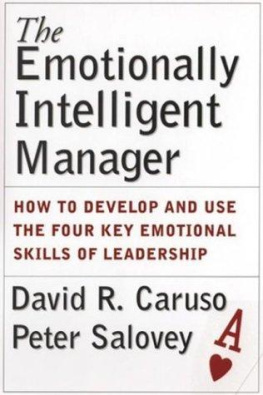PRAISE FOR Feeling Smart
Feeling Smart puts the social back into social science. The truth is that theres a touchy feely aspect of Game Theory, and Winter shows how expressing and understanding your feelings (and those around you) will help you become a far better strategist. Be smarter or be smarting, your call.
BARRY NALEBUFF, Milton Steinbach Professor, Yale School of Management, and coauthor of The Art of Strategy
We are used to thinking that emotions such as anger, love, insult, and so forth are irrational. In his new book, Eyal Winter explains why these emotions are actually very rational, fulfilling important functions that usually advance the most vital interests of each of us. This is an important, enjoyable, and convincing book.
ROBERT J. AUMANN, Nobel Laureate in Economics
Eyal Winter, a distinguished game theorist and behavioral economist, writes about rationality and emotion with compassion and empathy.
ALVIN ROTH, Nobel Laureate in Economics
Eyal Winter has written engagingly on the science of action and emotion; on why and how feelings make us smarter and are central to understanding rational action and interaction in processes of human betterment that are subtly inaccessible to our self-aware consciousness.
VERNON SMITH, Nobel Laureate in Economics
Emotions and rationality are often thought of as polar opposites. But Eyal Wintera leading game theorist and economistshows compellingly that emotions can actually promote rational behavior. His book makes fascinating reading.
ERIC MASKIN, Nobel Laureate in Economics
Eyal Winters book admirably draws together the important recent work on social and individual behavior and its implications for economic behavior. He shows clearly how the more traditional rational analysis remains an important part of explanation, but is by no means adequate. His exposition is breezily informal, yet rigorous; accounts from his family join seamlessly with citations on the literature, to which he himself has made significant contributions.
KENNETH ARROW, Nobel Laureate in Economics
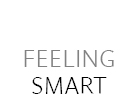


Copyright 2014 by Eyal Winter
Published in 2012 in Hebrew in Israel by Zmora Bitan
Published in 2014 in the United States by PublicAffairs,
a Member of the Perseus Books Group
All rights reserved.
Printed in the United States of America.
No part of this book may be reproduced in any manner whatsoever without written permission except in the case of brief quotations embodied in critical articles and reviews. For information, address PublicAffairs, 250 West 57th Street, 15th Floor, New York, NY 10107.
PublicAffairs books are available at special discounts for bulk purchases in the United States by corporations, institutions, and other organizations. For more information, please contact the Special Markets Department at the Perseus Books Group, 2300 Chestnut Street, Suite 200, Philadelphia, PA 19103, call (800) 810-4145, ext. 5000, or e-mail .
Book Design by Linda Mark
Text set in ITC Galliard 11.5 pt by the Perseus Books Group
Library of Congress Cataloging-in-Publication Data
Winter, Eyal.
[Regashot ratsyonaliyim. English]
Feeling smart : why our emotions are more rational than we think / Eyal Winter.First edition.
pages cm
Published in 2012 in Hebrew in Israel, by Zmora Bitan.
Includes bibliographical references and index.
ISBN 978-1-61039-491-8 (e-book : alk. paper)
1. Decision making. 2. Emotions. 3. Emotions and cognition. 4. Reason. I. Title.
BF448.W56413 2015
152.4dc23
2014036706
First Edition
10 9 8 7 6 5 4 3 2 1
Dedicated to my wife Atalia, who is both my emotional and my rational compass
CONTENTS
WHY CANT PEOPLE THINK MORE RATIONALLY? RELATIVE TO THE idealized image of the thinker, evolution has seemingly bequeathed to us several flaws. How else can we explain why we are so emotional? Of what benefit is it to a person to become angry? In a world as competitive as the one we inhabit, why are we occasionally struck by a sense of humility? Why do we turn beet red, making ourselves more noticeable at precisely the moments in which we most want to bury ourselves underground out of profound shame? As long as we are on this point, why feel shame at all? Or regret? Why are we filled with a burning passion for love? And what in the world possesses us to insist on fidelity to only one lover? Or to volunteer for the most dangerous military missions? There are a plethora of actions that we would simply refuse to undertake at all if we were only to stop a moment to think about them intelligently, carefully analyze the threats versus the opportunities, and coolly calculate the net benefits. At the same time, if we were to refuse to do them, we would cease to be human beings.
Mr. Spock, a character from the television series Star Trek, would regularly regard his shipmates on the starship Enterprise with a look of forgiveness mixed with arrogance. As a native of the planet Vulcan, Spock, in marked contrast to us, acted solely out of emotionless considerations of reason and logic. Is the sense of inferiority that we feel as we watch him act calmly and coolly in the face of the grave crises that he faced on Star Trek justified? The truth is that if the human race had developed along the lines of the emotion-free inhabitants of Vulcan, our lives would be considerably more difficult, and in all likelihood we would not have survived at all.
Many of us tend to think of decision making as a process in which two separate and opposite mechanisms are engaged in a critical struggle, with the emotional and impulsive mechanism within us tempting us to choose the wrong thing while the rational and intellectual mechanism that we also carry inside us slowly and ploddingly promises to lead us eventually to make the right choice. This description, which was also shared by many scientists until a few decades ago, is both simplistic and wrong.
Our emotional and intellectual mechanisms work together and sustain each other. Sometimes they cannot be separated at all. In many cases a decision based on emotion or intuition may be much more efficientand indeed betterthan a decision arrived at after thorough and rigorous analysis of all the possible outcomes and implications. A study conducted at the University of California at Santa Barbara indicates that in situations in which we are moderately angry, our ability to distinguish between relevant and irrelevant claims in disputed issues is sharpened. Another study that I coauthored reveals that our inclination to become angered grows in situation in which we can benefit from anger. In other words, there is logic in emotion and often emotion in logic.
How do emotions influence our decision making? Do they hinder us or help us? What is their role in social situations? How are collective emotions formed? What are the evolutionary mechanisms that made us both thinking and emotional creatures? This book attempts to answer these questions using insights from the latest research studies published in recent years on the seam between emotions and rationality.
Next page

